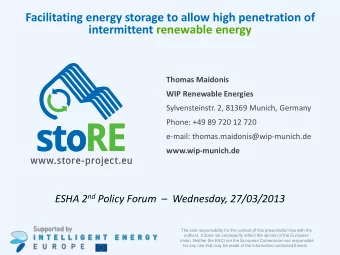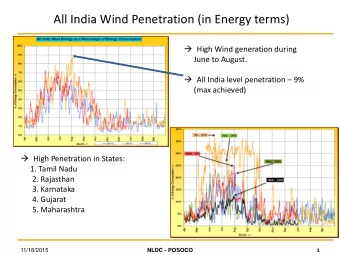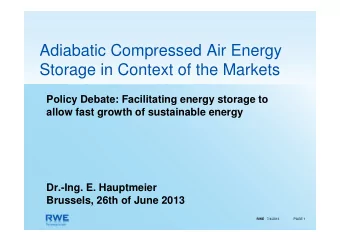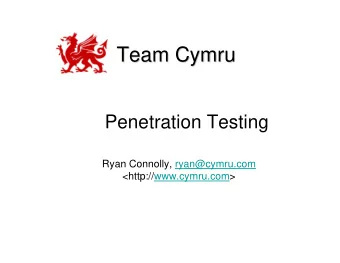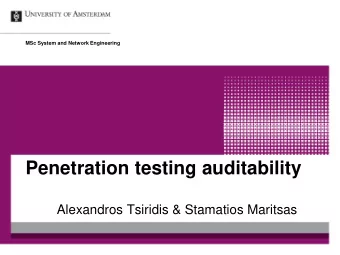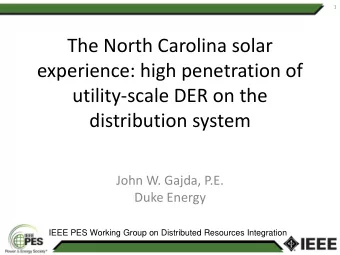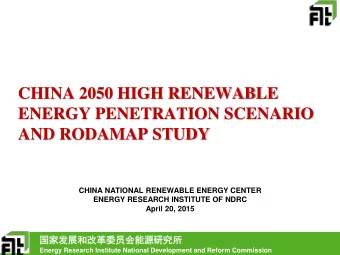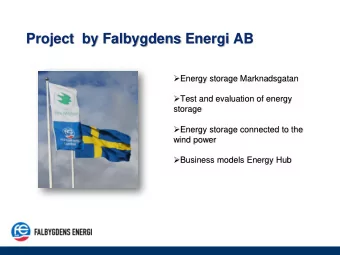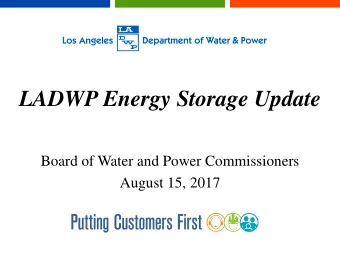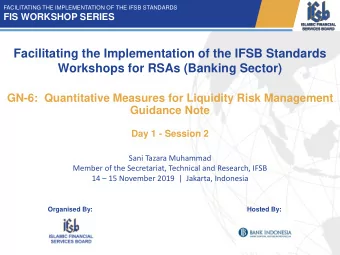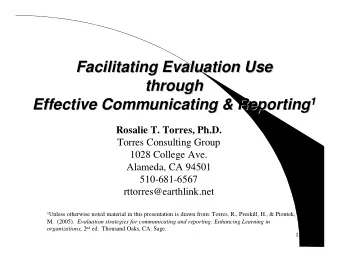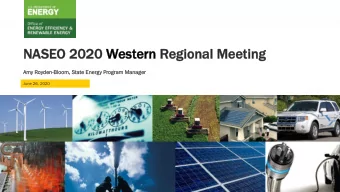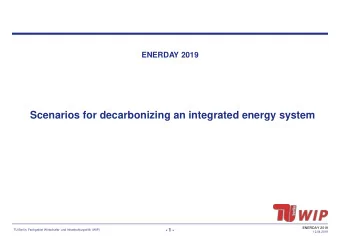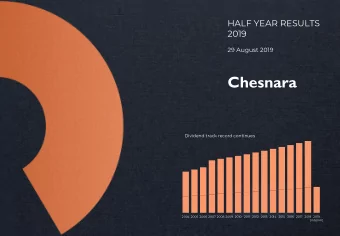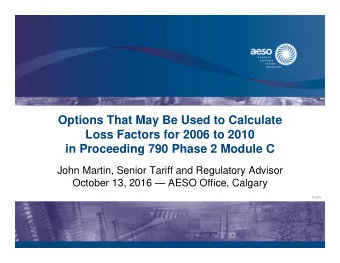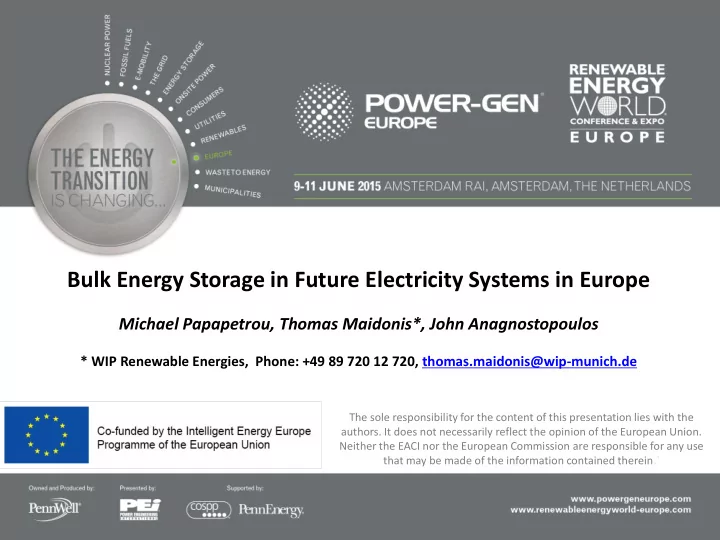
Facilitating energy storage to allow high penetration of variable - PowerPoint PPT Presentation
Facilitating energy storage to allow high penetration of variable renewable energy Bulk Energy Storage in Future Electricity Systems in Europe Michael Papapetrou, Thomas Maidonis, John Bulk Energy Storage in Future Electricity Systems in Europe
Facilitating energy storage to allow high penetration of variable renewable energy Bulk Energy Storage in Future Electricity Systems in Europe Michael Papapetrou, Thomas Maidonis, John Bulk Energy Storage in Future Electricity Systems in Europe Anagnostopoulos Michael Papapetrou, Thomas Maidonis*, John Anagnostopoulos * WIP Renewable Energies, Phone: +49 89 720 12 720, thomas.maidonis@wip-munich.de Michael Papapetrou, Project coordinator The sole responsibility for the content of this presentation lies with the WIP Renewable Energies authors. It does not necessarily reflect the opinion of the European Union. Neither the EACI nor the European Commission are responsible for any use Phone: +49 89 720 12 712, pmp@wip-munich.de that may be made of the information contained therein.` The sole responsibility for the content of this presentation lies with the authors. It does not necessarily reflect the opinion of the European Union. Neither the EACI nor the European Commission are responsible for any use that may be made of the information contained therein.`
Project Summary & Objectives The project aims to unlock the potential for energy storage infrastructure, through: Analysis of the energy storage status and potential Assessment of the environmental considerations Reviewing together with key stakeholders the regulatory and market framework conditions - at European level - in the 6 target countries Improving the general understanding of the energy storage benefits for the European power system.
Results Current Status, Role and Costs of Energy Storage Technologies The Role of Bulk Energy Storage in Facilitating Renewable Energy Expansion Environmental Performance of Existing Energy Storage Installations Furthering the Sustainable Development of Bulk Energy Storage Facilities Guidelines for the development of PHES in environmentally sensitive sites European Regulatory & Market Framework for Electricity Storage Infrastructure Energy Storage Needs in the target countries www.store-project.eu
Part 1 European Regulatory & Market Framework for Electricity Storage Infrastructure www.store-project.eu • Identify the key elements of the European market framework that potentially create unfavourable conditions for the development and operation of electricity storage infrastructure • Provide policy makers with recommendations for possible improvements
Directives, policies, funding instruments and other initiatives The Electricity Directive - Directive 2009/72/EC Market for Europe Single Energy The Renewable Energy Directive - Directive 2009/28/EC Framework Guidelines and Network Codes Better Governance for the Single Market - COM(2012) 259 Making the Internal Energy Market Work - COM(2012) 663 Energy Infrastructure Blueprint for an integrated European energy network - COM(2010) 677 Guidelines for trans-European energy infrastructure - COM(2011) 658 Package Establishing the Connecting Europe Facility - COM(2011) 665 The Ten Year Network Development Plan (TYNDP) The list of “Projects of Common Interest” (PCIs) Policies, directives & other initiatives directly related to RE
Survey Methodology Feedback Collection and analysis of from overall 55 experts, through a questionnaire, telephone interviews, four round table discussions, feedback to draft versions of the report, advisory board meetings Utilities / Associations Developers Research Institutes TSOs and others Industry DONG Energy EASE Gaelectric École Polytechnique 50Hertz Fédérale de Lausanne E.ON EREF HSE Invest JRC ELIA Endesa HEA JUWI KU, Leuven Red Eléctrica de España RWE Renewables Grid UPB/ROSHA RSE Philippe & Partners (law Initiative (RGI) firm), Verbund Climate Parliament Hydrowatt SiTI Electricity Authority of Cyprus Panasonic Smart Energy for Europe ELZACO Ltd University of Zagreb Europe Platform (SEFEP)
Recommendations to the EC 1. Re-evaluate the exemption of PHES from the financing provision of the infrastructure package , restricting only financing to plants that could be profitable without support. 2. Officially clarify the applicability of the unbundling principle to electricity storage (Article 9(1) of the Electricity Directive), by including a clear definition of electricity storage and propose an approach that: • Introduces clear restrictions to the use of electricity storage facilities by system operators if and when they are allowed some kind of control over them • Facilitates the market selection of the most efficient solution for transmission vs. storage. 3. Maintain the possibility to include in the PCI also projects not foreseen in the TYNDP. 4. Introduce targeted regulatory interventions and initiatives to ensure the timely development of storage infrastructure to the extent necessary. 5. Monitor and encourage the transposition of Electricity Directive Article 15 (7) to national legislation for transparent and market based mechanisms for balancing
Recommendations to ACER & ENTSO-E 1. Include definitions of electricity storage in the network codes , also taking into account smaller scale systems, in order to facilitate the development of similar administrative procedures in the Member States for their connection to the grid. 2. Develop a method to calculate grid fees that will take the real impact of the electricity storage system on the grid into account. 3. Apply common rules across Europe regarding grid fees in order to avoid deployment of a project in one country and provision of services in another, due to different framework conditions. 4. Critically review the Cost Benefit Analysis methodology developed for the evaluation of the proposed Projects of Common Interest to ensure that it is fair and treats electricity storage projects in equal terms with transmission and generation projects.
Recommendations to project developers & other stakeholders 1. Closely monitor the on-going development of the network code on balancing in order to ensure that electricity storage facilities will gain full access to cross border markets. 2. Monitor the transposition of Electricity Directive Article 15 (7) to national legislation for transparent and market based mechanisms for balancing 3. Critically review the Cost Benefit Analysis methodology developed for the evaluation of the proposed Projects of Common Interest to ensure that it is fair and treats electricity storage projects in equal terms with transmission and generation projects.
Part 2 Estimating the energy storage needs in Austria, Denmark, Germany, Greece, Ireland and Spain www.store-project.eu
Process Renewable Seperation of Calculation of energy long and short Calculation of total energy development term energy residual load storage needs scenarios storage needs
Development scenarios in stoRE Target Heating 40% RE 80% RE Import/Export country sector Already more than 40% RE Yes, combined system Austria 2050 scenarios GREEN, BAU No 2020 scenarios A,B,C Germany - Austria Scenarios 2020 A,B,C Yes, import/export via Denmark One scenario Yes, for 80% RE Different wind development AC to Germany 3 scenarios A,B,C 3 scenarios A,B,C Germany No No Different RE development Different RE development 2 Scenarios A,B 3 scenarios A,B,C Greece No No Strong PV, strong Wind Different RE development Scenarios 2020 A,B,C Yes, import/export via Ireland One scenario No Different wind development HVDC to GB 2 Scenarios A,B 2 Scenarios A,B Spain No No Strong PV, strong Wind Strong PV, strong Wind
Process Seperation of Development Calculation of long and short Calculation of of renewable total energy term energy residual load energies storage needs storage needs
Calculation of residual load Calculation of residual load in Greece – 80% RES scenario
Process Seperation of Development Calculation of long and short Calculation of of renewable total energy term energy residual load energies storage needs storage needs
Storage needs for 80% RES Zero curtailment & Unlimited Transmission Additional Needed Capacity Additional Needed Countries [GW] Stored Energy Charging Discharging [GWh] Austria 0 - 2,98 0 0 Germany 31,85 - 55,16 25,17 - 29,04 950 - 1.534 Denmark 4,85 3,25 660,75 Ireland 6.8 4.3 2.700 Spain 34,2 - 46,8 30,4 - 36,8 640 - 6.340 Greece 10,6 - 15,1 8 - 8,3 340 - 1.550
Storage needs for 80% RES Zero curtailment & Unlimited Transmission Additional Needed Capacity Additional Needed Countries [GW] Stored Energy Charging Discharging [GWh] Austria 0 - 2,98 0 0 Germany 31,85 - 55,16 25,17 - 29,04 950 - 1.534 Additionally Needed Capacity Denmark 4,85 3,25 660,75 Scenario Additionally Needed (GW) 80% RE Stored Energy (GWh) Ireland 6.8 4.3 2.700 Charging Discharging Equal 38.79 25.17 1,308 Spain 34,2 - 46,8 30,4 - 36,8 640 - 6.340 Wind 31.85 25.74 1,534 Greece 10,6 - 15,1 8 - 8,3 340 - 1.550 PV 55.16 29.04 950
Recommend
More recommend
Explore More Topics
Stay informed with curated content and fresh updates.
